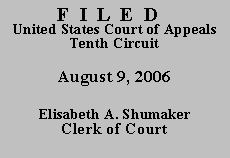

| UNITED STATES OF AMERICA,
Plaintiff-Appellee,
v.
DONALD PRITCHARD Defendant-Appellant. |
No. 05-1336
(D.C. No. 05-D-130) (D.C. No. 01-CR-288-D) (Colorado) |
Issuance of a COA is jurisdictional. Miller-El v. Cockrell, 537 U.S. 322, 335-36 (2003). A COA can issue only "if the applicant has made a substantial showing of the denial of a constitutional right." 28 U.S.C. § 2253(c)(2). An applicant "satisfies this standard by demonstrating that jurists of reason could disagree with the district court's resolution of his constitutional claims or that jurists could conclude the issues presented are adequate to deserve encouragement to proceed further." Miller-El, 537 U.S. at 327. "The COA determination under § 2253(c) requires an overview of the claims in the habeas petition and a general assessment of their merits." Id. at 336. "This threshold inquiry does not require full consideration of the factual or legal bases adduced in support of the claims. In fact, the statute forbids it." Id. Although Mr. Pritchard is not required to prove the merits of his case to obtain a COA, he must demonstrate "something more than the absence or frivolity or the existence of mere good faith" on his part. Id. at 338. A prisoner seeking ifp status must demonstrate financial inability to pay and existence of "a reasoned, nonfrivolous argument on the law and the facts in support of the issues raised on appeal." McIntosh v. United States Parole Comm'n, 115 F.3d 809, 812-13 (10th Cir. 1997) (internal quotation marks omitted). Because we conclude that Mr. Pritchard has not even made a showing of good faith and the absence of frivolity, we deny both his application for COA and his motion for leave to proceed ifp on appeal.
Mr. Pritchard was convicted after a jury trial on eight counts of wire fraud in violation of 18 U.S.C. § 1343, and the district court sentenced him to thirty-four months imprisonment on each count, to be served concurrently. We affirmed. United States v. Pritchard, 86 Fed. Appx. 387 (10th Cir. Jan. 23, 2004). He timely filed this § 2255 motion presenting three claims. First, he contended his attorney provided ineffective assistance of counsel by failing to object to the district court's findings regarding the calculation of loss for guidelines sentencing purposes and for failing to argue that Mr. Pritchard was, himself, a victim of fraud. Second, he claimed the government's civil forfeiture action against his house and property violated the Double Jeopardy Clause. Finally, he asserted the district court imposed his sentence in violation of United States v. Booker, 543 U.S. 220 (2005). The district court considered all claims on their merits and denied the motion.
After reviewing the record and the parties' arguments to the district court, we conclude reasonable jurists could not find the district court's resolution of these three claims debatable. Regarding Mr. Pritchard's ineffective assistance of counsel claims, the district court correctly applied the United States Supreme Court's two-prong inquiry set forth in Strickland v. Washington, 466 U.S. 668 (1984), and concluded Mr. Pritchard failed to show that his counsel's performance fell below an objective standard of reasonableness or prejudiced him. The record amply supports the district court's conclusion for the reasons stated in its opinion.
Regarding Mr. Pritchard's double jeopardy claim, the district court correctly pointed to the United Supreme Court's holding in United States v. Ursery that "[i]n rem forfeiture is a remedial civil sanction, distinct from potentially punitive in personam civil penalties such as fines, and does not constitute a punishment under the Double Jeopardy Clause." 518 U.S. 267, 278 (1996). See also United States v. One Parcel of Real Prop. Described As Lot 41, Berryhill Farm Estates, 128 F.3d 1386, 1391 (10th Cir. 1997). Reasonable jurists would not find debatable the district court's determination that Mr. Pritchard's double jeopardy claim was foreclosed by law.
Finally, regarding Mr. Pritchard's claim that his sentence was invalid because it was based on facts not found by the jury in violation of Booker, the district court correctly stated that the Booker decision is an extension of the Supreme Court's holdings in Apprendi v. New Jersey, 530 U.S. 466 (2000), and Blakely v. Washington, 542 U.S. 296 (2004). The district court recognized our court has held that Apprendi and Blakely may not be applied retroactively in a § 2255 motion. See United States v. Price, 400 F.3d 844, 849 (10th Cir. 2005); United States v. Mora, 293 F.3d 1213, 1219 (10th Cir. 2002). Moreover, in United States v. Bellamy, we concluded similarly that Booker does not apply retroactively on collateral review. 411 F.3d 1182, 1187-88 (10th Cir. 2005). We are not persuaded that reasonable jurists could find this conclusion debatable.
For the foregoing reasons, we DENY Mr. Pritchard's application for COA and DISMISS his appeal. We also DENY his motion to proceed ifp on appeal.
Entered for the Court
Stephanie K. Seymour
Circuit Judge
*.After examining appellant's brief and the appellate record, this panel has determined unanimously that oral argument would not materially assist the determination of this appeal. See Fed. R. App. P. 34(a)(2) and 10th Cir. R. 34.1(G). The case is therefore submitted without oral argument. This order and judgment is not binding precedent, except under the doctrines of law of the case, res judicata, or collateral estoppel. The court generally disfavors the citation of orders and judgments; nevertheless, an order and judgment may be cited under the terms and conditions of 10th Cir. R. 36.3.
1.Because he is proceeding pro se, we review Mr. Pritchard's pleadings and filings liberally. See Haines v. Kerner, 404 U.S. 519, 520-21 (1972); Hall v. Bellmon, 935 F.2d 1106, 1110 (10th Cir. 1991).
2.The district court denied Mr. Pritchard's application for a COA, as well as his motion for leave to proceed in forma pauperis on appeal.